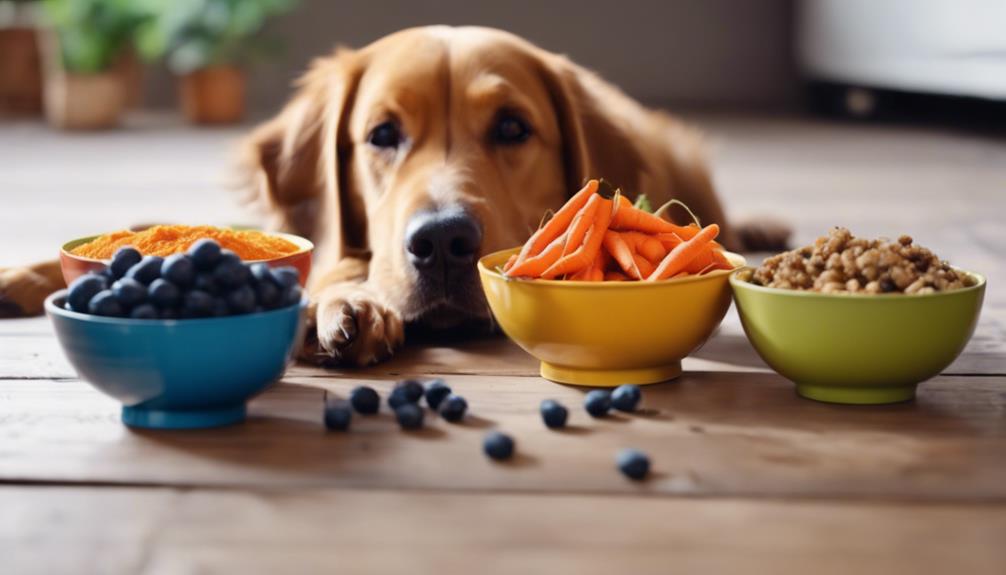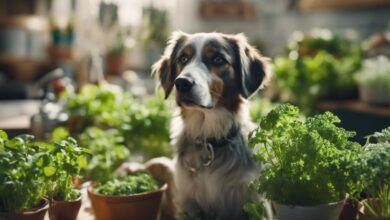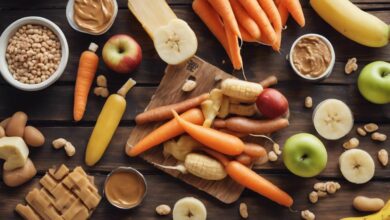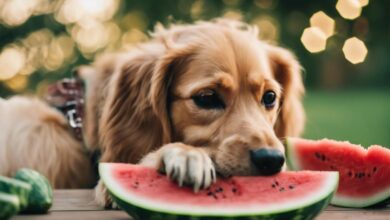What Foods Can My Dog Eat
Help your dog thrives with safe foods like lean meats – chicken, turkey, or beef. Opt for specially formulated dog foods to meet their dietary needs. Add fruits such as apples, blueberries, and bananas in moderation for added nutrients. Carrots, sweet potatoes, and green beans are healthy veggie options worth exploring. Variety in protein sources like chicken, beef, or fish keeps their diet balanced. Whole grains like brown rice and oats offer essential nutrients. Avoid toxic foods like azaleas and tulips for your dog's well-being. Stay informed about the best food choices to keep your furry friend healthy and happy.
Key Takeaways
- Meaty treats like chicken or beef provide essential protein for dogs.
- Healthy fruits like apples and blueberries offer vitamins and minerals.
- Safe veggies such as carrots and broccoli are nutritious and low in calories.
- Variety in protein sources like venison or fish ensures a balanced diet.
- Whole grains like brown rice and oats offer fiber and essential nutrients for dogs.
Foods Safe for Dogs
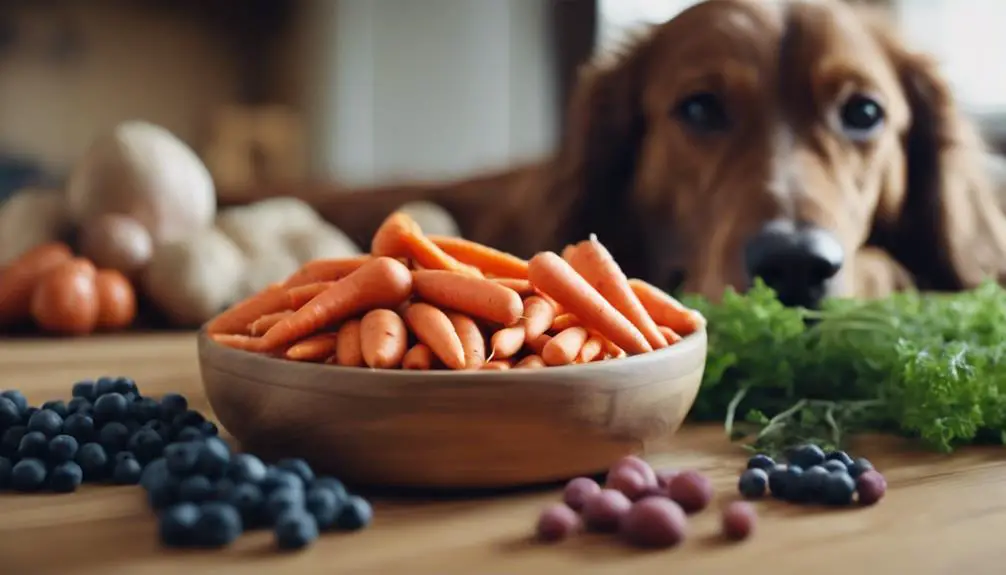
When feeding your canine companion, it is important to know which foods are safe for dogs to consume without risking their health. Meaty treats are a popular choice among dog owners, providing protein and essential nutrients for your furry friend. Opt for high-quality, lean meats such as chicken, turkey, or beef, ensuring they are cooked thoroughly and free from any seasoning or bones that could pose a choking hazard. Additionally, exploring the world of canine cuisine can introduce your pet to specially formulated dog foods that cater to their dietary needs. These specialized foods often contain a balanced mix of proteins, carbohydrates, and vitamins vital for your dog's overall well-being. Remember, always consult with your veterinarian for specific dietary recommendations tailored to your dog's individual requirements.
Healthy Fruits for Dogs
To guarantee your furry friend's diet remains diverse and nutritious, consider incorporating healthy fruits that are safe for dogs. Fruit treats can be a tasty and healthy addition to your dog's diet, providing essential vitamins, minerals, and fiber. When feeding your dog fruits, always remember moderation is key, as fruits contain natural sugars that can be too much for your canine companion in large quantities. Some fruits that are safe for dogs include apples (without seeds), blueberries, watermelon (without seeds), and bananas. These fruits can be given as occasional treats to supplement your dog's regular diet and enhance their canine nutrition. Remember to remove any seeds, pits, or stems before offering fruits to your dog to prevent choking hazards or toxic reactions.
Vegetables Dogs Can Eat
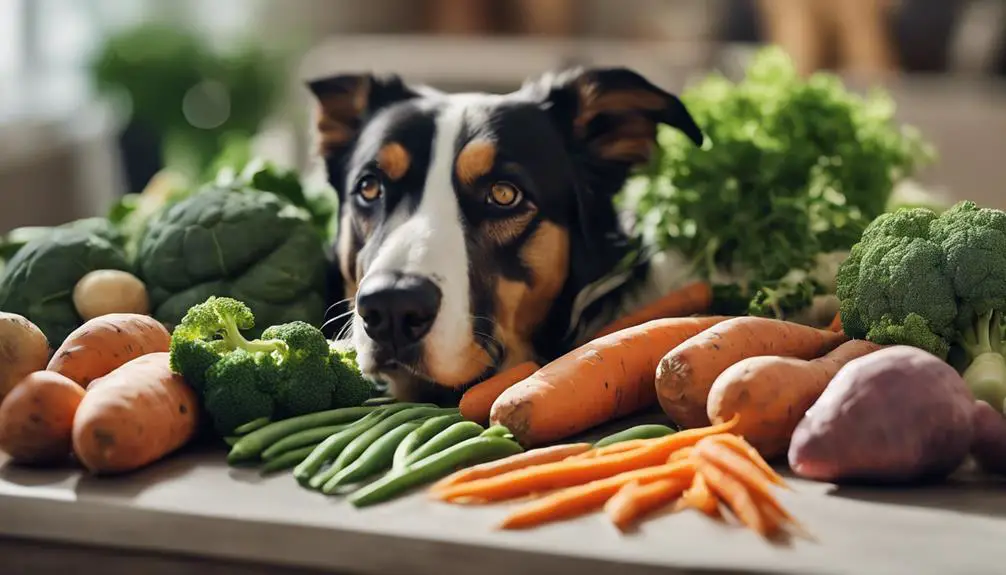
When it comes to vegetables dogs can eat, it's important to choose safe options that provide numerous benefits. Including veggies in your dog's diet can offer essential nutrients, vitamins, and fiber to support their overall health. Consider adding safe veggie choices to your furry friend's meals for a well-rounded diet.
Safe Veggie Options
Explore a variety of safe veggie options that can be beneficial for your dog's diet. When it comes to veggie treats for your furry friend, there are several dog-friendly veggies to choose from. Carrots are an excellent choice as they are low in calories and high in fiber, promoting good digestion. Sweet potatoes are another great option packed with essential vitamins and minerals like Vitamin A and C. Green beans are a nutritious snack that can be fed raw or cooked to add some crunch to your dog's diet. Broccoli is rich in antioxidants and can be a tasty addition to their meals. Remember to always introduce new veggies gradually to make sure your dog tolerates them well.
Benefits of Veggies
Considering the numerous safe veggie options available for dogs, understanding the benefits of incorporating these vegetables into your pet's diet can help promote their overall health and well-being.
- Veggie benefits: Vegetables are packed with essential vitamins and minerals that can support your dog's immune system.
- Nutritious options: Opting for veggies like carrots and green beans can provide a low-calorie, high-fiber snack for your furry friend.
- Dental health: Crunchy vegetables like celery can help improve your dog's dental health by reducing plaque and freshening breath.
- Weight management: Incorporating veggies into your dog's meals can help them feel full without consuming excess calories, aiding in weight management.
Protein Sources for Dogs
To guarantee a balanced diet for your canine companion, incorporating a variety of protein sources is crucial. Novel protein options such as venison, rabbit, or duck can provide your dog with new and exciting flavors while ensuring they receive essential nutrients. Homemade protein treats are another great way to introduce different protein sources into your dog's diet. You can easily make treats using ingredients like cooked chicken, beef, or fish. These treats not only offer a tasty snack but also contribute to your dog's overall protein intake. Remember to consult your vet before introducing any new protein sources to confirm they are suitable for your dog's specific dietary needs.
Grains and Carbs for Dogs
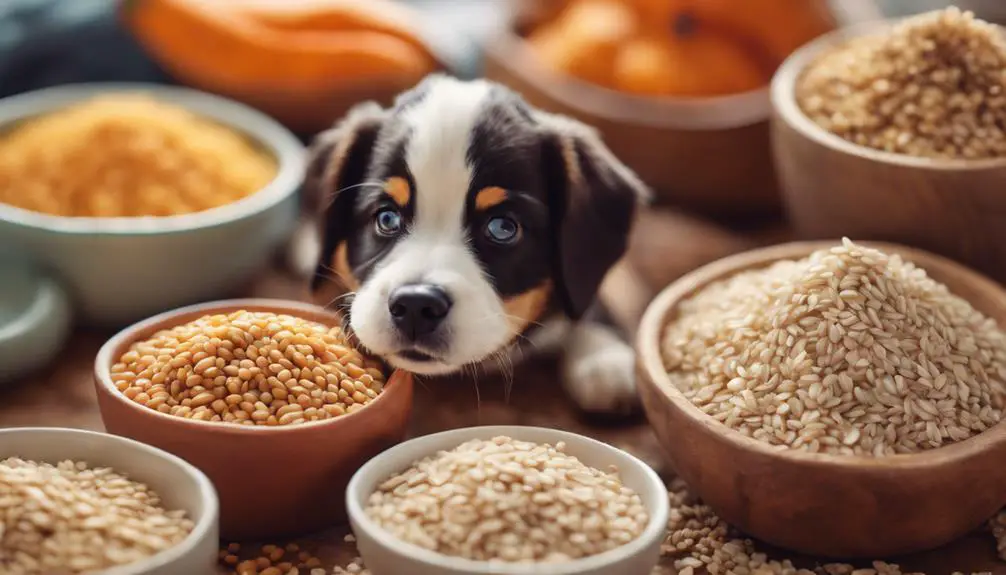
When selecting grains and carbohydrates for your dog's diet, prioritize options that offer nutritional value and are easily digestible. Here are four items worth including in a balanced diet:
- Whole grains: Opt for whole grains like brown rice, quinoa, and oats as they provide essential nutrients and fiber for your dog's overall health.
- Sweet potatoes: A great source of carbohydrates, fiber, and vitamins, sweet potatoes are gentle on your dog's stomach and offer a tasty alternative to traditional grains.
- Barley: Rich in fiber and nutrients, barley can aid in digestion and provide sustained energy for your furry friend.
- Legumes: Including lentils and peas in your dog's diet can offer a plant-based source of protein and carbohydrates, complementing their meat intake.
Foods Toxic to Dogs
Be cautious of specific foods that can be toxic to dogs, as they pose serious health risks and should be strictly avoided in their diet. Some common toxic plants that can harm dogs include azaleas, tulips, daffodils, and sago palms. These plants can cause symptoms such as vomiting, diarrhea, lethargy, and even organ failure if ingested. Additionally, certain herbs that are safe for dogs, such as parsley and basil, can be mistaken for toxic plants like chives, garlic, and onions, which are harmful to dogs. Understanding these toxic plants and herbs is crucial for your dog's safety. Always consult with your veterinarian if you suspect your dog has ingested something toxic.

If Richie Bedard is a dog food expert, author, or any other figure in the field of dog nutrition that emerged after September 2021,
